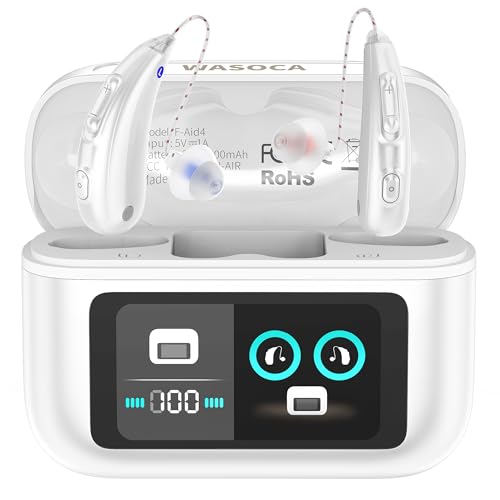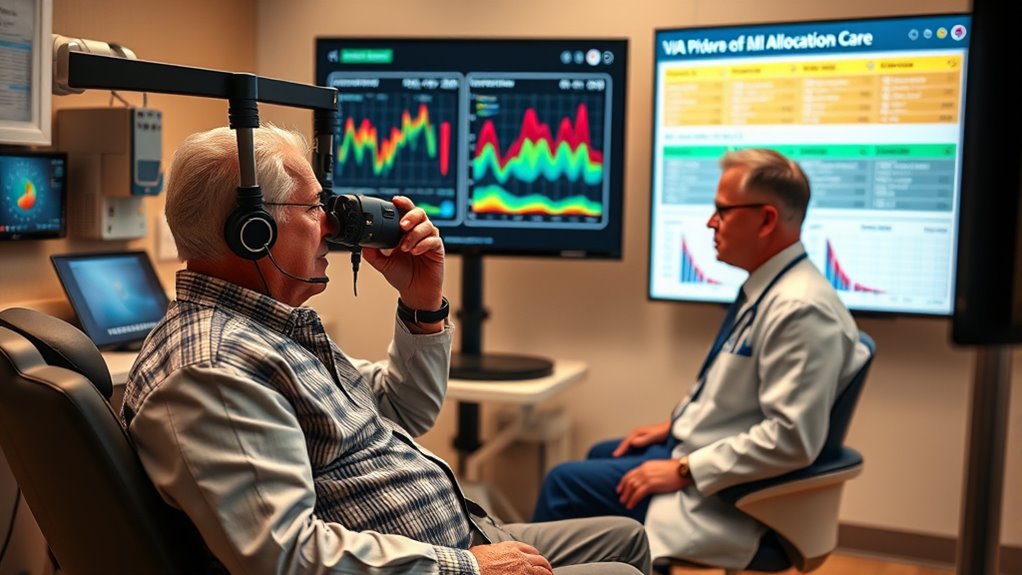Your VA priority group determines how quickly and what level of audiology care you receive. Veterans with service-connected hearing loss often fall into higher priority groups, meaning faster access to evaluations, hearing aids, and ongoing support. Lower priority groups may face longer wait times or limited services. Understanding your priority status helps you navigate the system and guarantees you get the care you need. Keep exploring to learn how your specific group impacts your audiology benefits.
Key Takeaways
- Veterans in higher priority groups, such as those with service-connected hearing loss, generally receive faster and more comprehensive audiology services.
- Service-connected hearing disabilities often place veterans in higher priority groups, improving access to evaluations and hearing aids.
- Lower priority groups may experience longer wait times and limited audiology services due to resource allocation.
- Priority status influences benefits eligibility and the urgency of care provided by VA audiology clinics.
- Knowing your VA priority group helps in navigating available audiology services and advocating for timely care.

Have you ever wondered how the VA determines who gets priority for audiology care? It all comes down to the VA’s priority groups, which are designed to guarantee that those with the greatest needs receive timely service. Your benefits eligibility plays a vital role here. If you qualify for VA health care benefits based on your military service, your specific priority group will influence how quickly you can access audiology services. For example, veterans with service connected hearing loss typically receive a higher priority because their condition is directly linked to their military service. This means you’re more likely to get prompt attention for your audiology needs, compared to veterans whose hearing issues aren’t connected to their service.
The VA categorizes veterans into different priority groups, from Group 1 to Group 8, based on factors like service-connected disabilities, income level, and military retirement status. Those with a service connected hearing impairment often fall into a higher priority group because their hearing loss is recognized as a disability related to their time in uniform. This recognition not only assures you benefits eligibility but also guarantees a certain level of access to audiology care. The VA understands that service connected hearing issues can greatly impact your daily life, so they prioritize treatment for those with these conditions. If your hearing loss is service connected, you’re more likely to be seen sooner and receive extensive audiology services, including evaluations, hearing aid fittings, and ongoing support.
However, if your hearing difficulties aren’t linked to your military service, you might fall into a lower priority group, which can mean longer wait times for care or limited services depending on your overall eligibility status. The VA’s system aims to balance resources by giving precedence to those with the greatest health needs, especially when their hearing problems are directly related to their service. Your benefits eligibility, particularly for service connected hearing loss, determines your position within these groups and influences what kind of audiology care you can access and how quickly you can get it. Additionally, understanding the Resources and Tools available can help you better navigate the process and advocate for your needs.
Understanding your VA priority group can help you navigate the process more effectively. If you’re unsure about your benefits eligibility or how your service connected hearing condition impacts your priority status, reaching out to your VA representative can clarify your standing. Being aware of where you stand helps you advocate for the care you deserve and plan accordingly. In the end, the VA’s priority system is designed to serve those with the most urgent and service-related needs first, making it essential to know how your benefits eligibility and service connected hearing influence your access to audiology care.

ELEHEAR-Beyond Pro Hearing Aids, Bluetooth OTC Hearing Aids for Seniors and Adults, Premium Sound Algorithm with VocClear 2.0, 30% Clearer Speech, Music Mode & Enhanced App, Bluetooth Streaming
Ultra-clear, Natural Sound – Powered by VocClear 2.0 technology that delivers 30% clearer speech, ELEHEAR-Beyond Pro hearing aids…
As an affiliate, we earn on qualifying purchases.
As an affiliate, we earn on qualifying purchases.
Frequently Asked Questions
Do All VA Facilities Provide Audiology Services for Every Priority Group?
Not all VA facilities provide audiology services for every priority group. Facility accessibility and equipment availability vary, which can affect service availability. Some VA centers prioritize higher priority groups, offering extensive audiology care, while others may have limited services for lower priority groups. To make certain you get the care you need, contact your local VA facility first to confirm their audiology services and whether they can accommodate your specific priority group.
How Long Is the Typical Wait Time for Audiology Appointments by Priority Group?
You might wait about two to four weeks for an audiology appointment, but wait time variability depends on your priority group. For example, a veteran in Priority Group 1 with urgent needs could get quicker appointment scheduling than someone in a lower group. Generally, higher priority groups experience shorter wait times, but factors like clinic demand can influence this. Stay proactive and check with your local VA for the most accurate scheduling info.
Are There Private Options if VA Audiology Services Are Unavailable?
If VA audiology services are unavailable or wait times are too long, you can explore private options. Your eligibility criteria for private care depend on your insurance coverage and specific circumstances. You might need to pay out-of-pocket or use insurance benefits. It’s best to check with your provider and VA for guidance on qualifying for private audiology services and understanding any costs involved.
Can Veterans Switch Priority Groups Based on Changing Health Conditions?
Think of your priority group as your health’s traffic light—changing with your health. Yes, you can request priority group updates if your health condition changes. You’ll need to provide documentation showing the new health issues. The VA reviews these updates diligently, and if your condition warrants it, your priority group can be modified. Stay proactive and keep your records current to ensure you get the care you deserve.
What Documentation Is Needed to Qualify for Audiology Care Under a Specific Priority Group?
To qualify for audiology care under a specific priority group, you need to provide documentation requirements like proof of military service, disability ratings, or income. Your eligibility verification typically includes VA or military records, medical documentation of hearing issues, and proof of income if applying for financial-based priority groups. Make sure to gather all relevant documents beforehand to streamline the process and confirm your eligibility for audiology services.
digital audiology evaluation kit
As an affiliate, we earn on qualifying purchases.
As an affiliate, we earn on qualifying purchases.
Conclusion
So, while VA priority groups are meant to streamline your audiology care, they can ironically create barriers instead. You might think your service-connected hearing loss guarantees prompt treatment, but in reality, your priority level could delay your access. It’s a strange system where those who need help the most sometimes wait the longest. So, next time you wonder about the system’s fairness, remember—your service might get you in faster, or it might just leave your ears waiting in line.

(24-Pcs) Starkey Hear Clear Hearing Aids Wax Guards Filters.Starkey Hearing Aid Replacement Parts Supplies Cleaning Kit Accessories,Ear Replacement Parts Cleaning Tool
【Compatibility】- Starkey Hear Clear Wax Guards Filters work with Starkey Livio, Livio Al and custom hearing aids, are…
As an affiliate, we earn on qualifying purchases.
As an affiliate, we earn on qualifying purchases.

Hearing Aids for Seniors,Hearing Aids with Bluetooth, Rechargeable Hearing Aids with LED Digital Display, FSA&HSA Eligible, Intelligent Noise Cancellation, 5 Levels of Volume Adjustment, Hearing Amplifiers with APP, Easy to Use and Clear Sound
Intelligent Noise Reduction, Clear Sound Quality: The hearing aids features a built-in 16-channel digital chip and utilizes intelligent…
As an affiliate, we earn on qualifying purchases.
As an affiliate, we earn on qualifying purchases.










